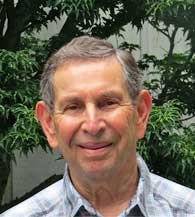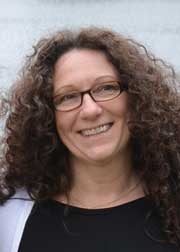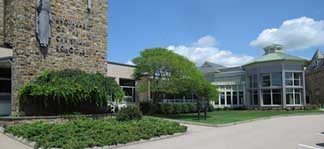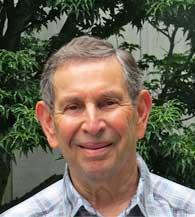 KINGSTON, R.I. – August 4, 2014 – Troubled male teens have a much better chance at straightening out their lives at Ocean Tides, a residential facility for boys, instead of at home or in prison.
KINGSTON, R.I. – August 4, 2014 – Troubled male teens have a much better chance at straightening out their lives at Ocean Tides, a residential facility for boys, instead of at home or in prison.
Those are among the findings of two University of Rhode Island professors, who conducted an exhaustive study of the Narragansett school that will soon result in a book, Tides of Misfortune and Mayhem: Treating Male Juvenile Delinquents.
Lawrence C. Grebstein, of South Kingstown, professor emeritus of psychology and a consultant to Ocean Tides for 39 years, and Judy A. Van Wyk, of West Greenwich, associate professor of sociology, say their results show the benefit of treating troubled youths at residential facilities.
Such facilities, they say, provide a far better way to help troubled teens than placing them in home confinement, where they are likely to be exposed to violence, abuse and other issues that led to their problems in the first place. Prison also does little to rehabilitate troubled youths, they say.
 “Bad parenting is only one source of potential strain in a young man’s life. Another is the absence of positive parenting,” says Van Wyk. “We argue that one of the most effective strategies for helping these teens is when support people become surrogate parents. Ocean Tides provides this role.”
“Bad parenting is only one source of potential strain in a young man’s life. Another is the absence of positive parenting,” says Van Wyk. “We argue that one of the most effective strategies for helping these teens is when support people become surrogate parents. Ocean Tides provides this role.”
The professors looked at 1,585 teenagers who lived at the facility from its opening in 1975 through 2006. Most of the teens were on probation or have been in the Rhode Island Training School, a state prison for juveniles.
It took 12 years to collect and analyze the data, recorded in an electronic database designed by Van Wyk and Grebstein. Undergraduate and graduate students in psychology and sociology at URI assisted with the project. A URI math student also helped.
The researchers looked at the boys’ ethnicity and socio-economic status, court records, academic transcripts, psychological evaluations and progress reports from Ocean Tides. They also examined whether there was any history of substance or physical abuse among parents.
According to the professors, the database is the largest and most comprehensive collected in the United States of youths who have been charged and convicted of crimes. The team took steps to protect the boys’ confidentiality.
“One of the things that makes this study unique is the richness of our sources,” she says. “Most reports focus on the criminal record of the youth. They miss the big picture and the little details. Multiple sources are crucial in evaluating what actually happened in these kids’ lives.”
Among the findings:
* Nearly 60 percent of the boys behaved violently before entering the program; that figure dropped to 22 percent while they were at Ocean Tides.
* Nearly 63 percent of the youths who enroll in Ocean Tides graduate from the program, which lasts from three months to a year.
* Youths who have been abused by their parents or who have seen their parents abuse each other are more likely to be violent than youths who have not been exposed to violence in the home.
 “There’s something going on at Ocean Tides that lets them start over again,” says Van Wyk. “It’s almost like a new beginning for them. Ocean Tides provides a surrogate parent for these boys – they educate the boys, they teach them values, they help the boys develop their own skills and talents that can be put to productive use, instead of crime. At Ocean Tides, they do the kinds of things a good mom and dad do. Kids are able to have positive family experiences. It sets them on a new track.”
“There’s something going on at Ocean Tides that lets them start over again,” says Van Wyk. “It’s almost like a new beginning for them. Ocean Tides provides a surrogate parent for these boys – they educate the boys, they teach them values, they help the boys develop their own skills and talents that can be put to productive use, instead of crime. At Ocean Tides, they do the kinds of things a good mom and dad do. Kids are able to have positive family experiences. It sets them on a new track.”
Personal stories testify to the program’s strengths, the professors say. They recall one youth charged with manslaughter, assault, theft and possession of a firearm before he was 14. After four months at the Training School, he went to Ocean Tides. Now he’s a high school graduate working a construction job. Another youth charged with armed robbery credits Ocean Tides with giving them a new life. “There is not doubt that Ocean Tides has changed the way I act and think,” he wrote in a personal essay. “It’s like the sky is clearing after the storm. I really turned my life around.” In a big way: He’s in college.
The multidisciplinary study is also important because it can provide guidance to the state as it looks for less expensive and more effective ways to treat troubled teens, Van Wyk and Grebstein say. The study comes at a crucial time: To save money, the state for years has been cutting back on funding for residential programs for troubled kids. More cuts are expected.
“The state is realizing that it’s too expensive to send youths to the Training School,” says Van Wyk. “This study should pave the way for the expansion of more residential treatment facilities. They work, and we need to go in that direction, not prison.”
Located at the Christian Brothers Center in Narragansett, Ocean Tides is a residential program that teaches troubled boys how to thrive as adults. The school has 35 beds, down from 65 in 2008. There is also a non-residential Providence campus. Ocean Tides is funded by the state, private donors and public grants.
A second book by the writing team is on the horizon. Van Wyk and Grebstein hope to interview men who graduated from Ocean Tides decades ago to find out if the program worked – if they’re living happy lives.
“We know what happened to the youths when they were at Ocean Tides, and how the program greatly improved their lives,” says Van Wyk. “Now we want to track down the graduates and find out if the program has long-term benefits.”
Before retiring in 2006, Grebstein taught undergraduate and graduate courses in psychology for 42 years at URI. He has been a clinical psychology consultant to Ocean Tides since 1975. Van Wyk teaches courses in criminology, juvenile delinquency, family violence, terrorism, white-collar crime and sociology.
Pictured above: Lawrence C. Grebstein, professor emeritus of psychology at the University of Rhode Island, and Judy A. Van Wyk, associate professor of sociology at URI. Photos courtesy of Lawrence C. Grebstein and Judy A. Van Wyk.

